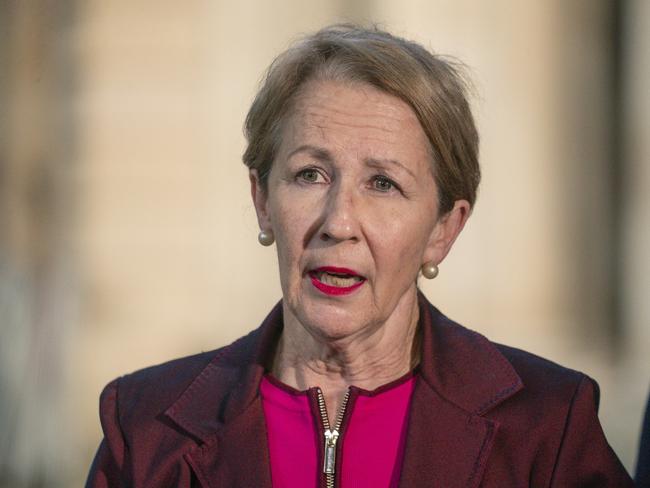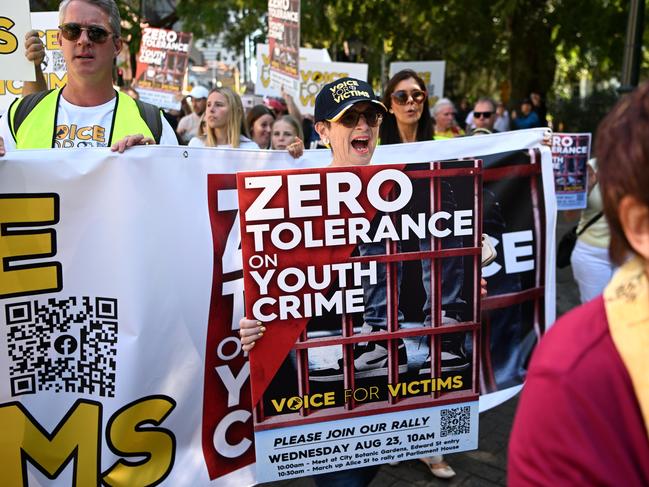Shock new data lays bare Qld’s youth crime crisis
Seventy per cent of young criminals are reoffending within six months of engaging with the state government’s youth justice corresponder teams, harrowing statistics have revealed.
QLD Politics
Don't miss out on the headlines from QLD Politics. Followed categories will be added to My News.
The state government says its youth justice corresponder teams have reduced the number of serious offences committed by juveniles, but 70 per cent of young criminals are still reoffending within six months of engaging with the program.
It comes as new data reveals rates of reoffending for juveniles sentenced to community service, supervised release, probation and intensive supervision orders have been increasing year on year since 2020-21.
An independent review into youth co response teams (YCRT) found that of 1,254 juveniles participating with the program across the state, just 9 per cent committed no crimes, with 91 per cent reoffending.
Despite this, one third of serious repeat offenders reduced their offending by engaging with Youth Co-Responder Teams (YCRT) officers, committing an average of seven offences compared to 25.
Specific crimes like breaking and entering and illegal use of a motor vehicle saw reductions of 71 per cent and 67 per cent respectively, while theft decreasing by 68 per cent.
Youth Justice Minister Di Farmer said the report shed a positive light on the government’s efforts to curb youth crime by reducing crimes committed by serious repeat offenders.
“The frequently of offending dropped, but if they did reoffend, was a it a shoplift to get food, was it a serious assault? You don’t know what some of those (offences) are,” Ms Farmer said.
“These are the hardest nuts to crack, with deeply entrenched behaviours.
“One regional area reported the number of serious repeat offenders went from 12 to six, and for a small town … that has an enormous impact.”
The report noted that data collection and reporting within YCRT had been inconsistencies were hindering the reviews assessment of the programs effectiveness and outcomes.
It recommended YCRT implement a consistent data reporting system, including recording a juvenile’s date of birth and the severity and history of their offending.

Ms Farmer said the review was a significant step in the youth justice department's ability to assess what was working, but conceded tackling youth crime was “a long game”.
“As evidence becomes available we need to chart a different course,” she said.
“We know we have to do a lot more, for First Nations people, for young girls, for people with disabilities.”
The number of juveniles serving court orders have been increasing every year since between April 2020 and April 2023, with the exception of graffiti removal orders, drug education, restitution and good behaviour bonds.
Of the small number of juveniles under the age of 13 sentenced with intensive supervision orders - the highest rehabilitation order handed down when a child has been on other orders and is most at risk of going to detention, 100 per cent reoffended within twelve months.
There were 233 children found guilty of offences which if committed by an adult, would see them jailed, who were given community service orders between 2022 and 2023 of those children, 214, or 91 per cent reoffended within twelve months.

Another 200 children were sentenced to supervised release orders, an order where a child is released from detention after a period of time and supervised by authorities while they reintegrate to the community.
Within 12 months of their release, 92 per cent reoffended.
There was also a 91 per cent reoffending rate for juveniles on conditional release orders, which saw them released back into the community instead of serving time in detention.
Lower sentences such as probation orders saw a 77 per cent reoffending rate, with 986 of the 1279 juveniles committing crimes within 12 months.
Those sentenced to detention saw a 89 per cent reoffending rate, slightly lower than 2021-22 (91 per cent) but higher than 2020-21 (86 per cent).
LNP spokeswoman for Youth Justice Laura Gerber said hardened youth offenders who continued to commit serious crimes were consistently escaping detention time.
“Without real consequences for actions, reoffending rates continue to skyrocket and youth offenders are on a repeat cycle of crime, all because Labor watered-down the laws a decade ago,” she said.
“We must break the cycle with consequences for crimes, early intervention to turn young lives around and intensive supervision for offenders leaving detention.”
Ms Gerber said if elected, the LNP would “restore” consequences for youth offenders by removing detention as a last resort and introducing harsher sentences for serious offences.




